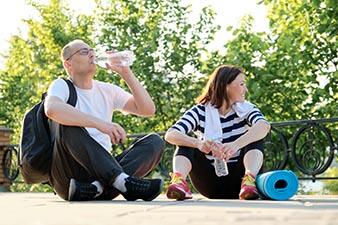Now that the warm weather is here and temperatures (and humidity) are on the rise, it is important to protect your heart from the hazards of the summer sun. Take some time to read these practical suggestions from Stony Brook cardiologist, On Chen, MD, to help you stay heart-safe all summer long.

- Pace yourself during warm weather
- Hydrate and eat water-rich foods
- Check with your doctor before participating in strenuous activities
People with an existing heart condition need to be careful with warmer temperatures, but even a healthy heart can be put under stress when temperatures climb. Following are tips for helping to make your summer heart-safe:
1. Know Your Numbers. Now is a good time to see your doctor to get a careful look at your "numbers," including your cholesterol and triglyceride levels, your blood pressure and more. Knowing your numbers and your risk factors are an important part of heart health, especially before engaging in warm-weather activities.
2. Timing is Everything. Avoid being outdoors during the hottest times of the day, when the sun is at its strongest and temps are at their highest. Your cardiovascular system has to work harder on a hot day in an effort to keep your body cool. In fact, for every degree that your body temperature rises, your heart has to pump an additional ten beats per minute. Everyone is at risk in extreme heat, but high temperatures and humidity are particularly stressful for those who already have a weakened heart.
3. Be Sun Savvy. A sunburn can dehydrate you and impede your body’s ability to cool. If you’re going to be outside during the peak sun of the day, be sure to apply sunscreen 30 minutes before you head out. Reapply every couple of hours.
4. Dress for Sun-cess. Think loose, light-colored clothing (to help reflect heat) that is made of a lightweight, breathable fabric like cotton. Add well-ventilated shoes, a wide-brimmed hat, shades and sunscreen and you’re good to go.
5. Staying Cool. If you don't have access to air conditioning, cold compresses (an ice-pack or ice-water filled bottle) applied to your ‘pulse points’ — the areas where your veins are closest to your skin’s surface, including wrists, neck, temples and armpits — can help you cool down.
6. Hydrate. Adequate hydration is nothing less than your best friend as the summer heat moves in. Drinking plenty of water helps regulate your temperature, helps your heart pump more easily and keeps all your organs functioning properly. Remember to drink before you are thirsty, and avoid alcohol and caffeinated beverages, which can dehydrate the body. And, it is important to know that some common heart medications can make you more vulnerable to high heat and increase your hydration needs. Talk to your doctor about your specific hydration needs.
7. Eat Water-Rich Foods. You get about 20 percent of your water from the foods you eat. A hot weather diet that emphasizes cold soups, salads and fruits can both satisfy hunger and provide extra fluid. Strawberries, watermelon, peaches, cucumbers, celery, tomatoes, peppers and spinach, are all fruits and veggies that are 90 percent or more water.
8. Pace Yourself. Make your warm weather workouts shorter and slower, aim for morning or evening when the temps and humidity are lower, choose shady pathways and trails or an air-conditioned space. Work with your healthcare team to develop a plan that is best for you.
9. Listen to your body. If you aren’t used to regular exercise, are over 50, have heart disease or have questions about your heart health, see your doctor before participating in any strenuous outdoor summer activities.
10. Know Heat Illness Warning Signs. Spending too much time in extreme heat may lead to heat exhaustion and, in turn, heatstroke, two serious heat-related illnesses in which your body can’t control its temperature.
- Heat Exhaustion Symptoms: Heavy sweating, nausea or vomiting, muscle cramps, tiredness, dizziness and fainting. Treatment: Move to a cool place, loosen clothing, use cold compresses, sip cool (not cold) water. If symptoms persist, call 911.
-
Heatstroke (also called Sunstroke) Symptoms: Fever of 104 degrees or more; severe headache; behavioral changes; confusion; hot, red skin; no sweating; rapid heartbeat and loss of consciousness. Treatment: Heatstroke is a life-threatening medical emergency. Call 911 immediately. Quickly move the individual to a cooler place, use cold compresses, do not give anything to drink.
Although anyone can be affected by heat illness, people with heart disease are at greater risk.
Put Your Heart Health First
If you are at risk or if someone in your family has a heart condition, it’s important to schedule a visit with a cardiologist for preventive care. Our cardiologists can help you improve your heart health and/or prevent the progression of cardiovascular disease with a comprehensive heart disease risk assessment and treatment options.
Do something good for your own heart health by taking a free heart health assessment now.
For information and appointments

